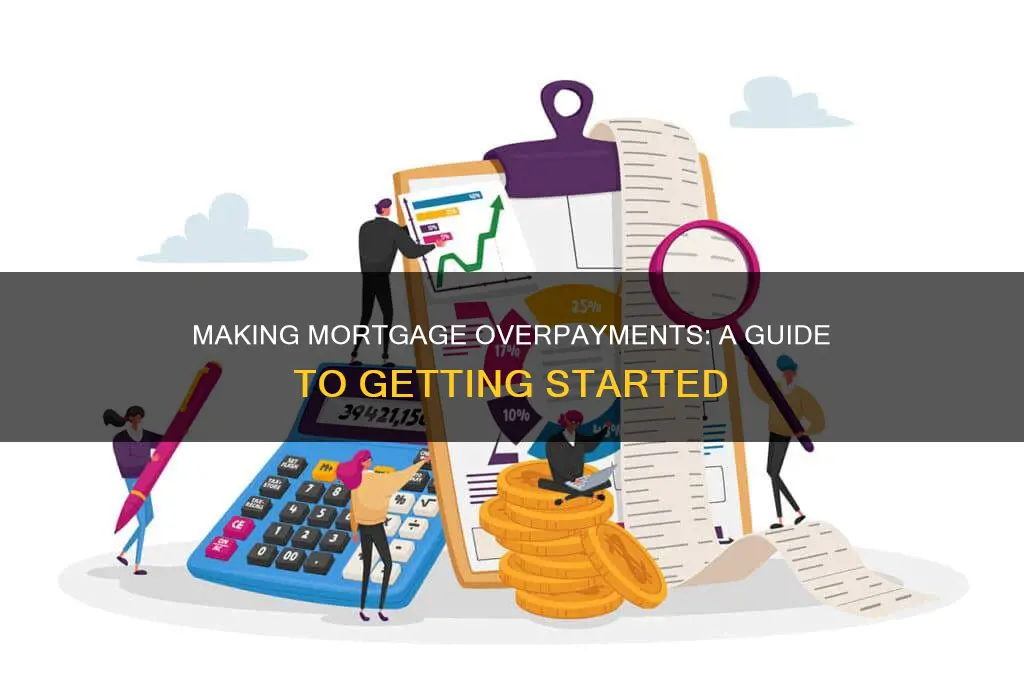
Making overpayments on your mortgage can help you save money and clear your mortgage balance quicker. Before making overpayments, it is important to check if your mortgage product has any restrictions regarding overpayments. Some mortgages allow unlimited overpayments, while others limit overpayments to a percentage of the amount owed. You can make one-off overpayments or set up regular overpayments. To make an overpayment, you can use online banking, mobile apps, or contact your lender directly.
| Characteristics | Values |
|---|---|
| Definition | Any additional payment you make over your usual monthly mortgage payment |
| Types | Regular overpayments, one-off lump sum overpayment |
| Benefits | Save money on the total amount of interest you pay, clear your mortgage balance quicker, save £1000s over the lifetime of a mortgage |
| Considerations | Whether your mortgage product has any restrictions regarding overpayments, whether you are likely to pay it all back before it's wiped in 30 years' time, whether you have an emergency fund |
| How to make an overpayment | Contact your lender, change your mortgage payment online, set up a separate standing order to your mortgage account, set up your mortgage account as a payee on your online banking |
What You'll Learn

Weigh up the pros and cons of overpaying your mortgage
There are several factors to consider when deciding whether to overpay on your mortgage. Overpaying on your mortgage can be a good idea if you want to reduce the amount of interest you pay and the length of your loan. This means you can become debt-free sooner. For example, if you make a £1000 overpayment on a mortgage with a 5% interest rate, then you save £50 in interest every year. Considering a mortgage can span 30 years, regular overpayments could save you thousands in interest over those years.
However, one of the most common downsides is early repayment charges (ERCs). Depending on your mortgage deal, you may incur a fee for paying extra on your mortgage. This tends to range between 1% and 5% of the amount overpaid. However, most lenders usually allow you to pay off a certain amount per year before you are charged an ERC. With NatWest, for example, you can pay up to 20% of the outstanding balance on each of your sub-accounts before an ERC will apply.
Another factor to consider is the opportunity cost of using your spare cash to make mortgage overpayments, which means you won't be able to use this money elsewhere. So take the time to weigh up your current financial situation and consider any other debt you may have. For example, if you have a student loan, you should usually prioritise your mortgage over repaying this. However, if you are earning over a certain threshold, you won't have to make monthly loan repayments anyway.
It is also important to consider the current financial climate. For example, if interest levels on savings accounts are low, using spare cash to pay extra on your mortgage may make more sense. However, savings aren’t the only alternative to mortgage overpayments. It might make sense to prioritise pension pots or long-term investments. That’s why it’s important to consider your financial goals and situation, alongside the current financial climate.
If you are considering overpaying your mortgage, it is important to check what type of mortgage you have. For example, if you have a tracker mortgage, you can usually make unlimited overpayments without an early repayment charge. If you have a flexible mortgage, you may have the option to underpay or take a mortgage holiday.

Check your mortgage type and overpayment allowance
Before making an overpayment, it is important to check your mortgage type and overpayment allowance. This is because different types of mortgages have different rules and limits for overpayments. For example, if you have a tracker mortgage, you can typically make unlimited overpayments without an early repayment charge. On the other hand, fixed-rate mortgages often have an annual overpayment limit of 10% of your total outstanding mortgage balance. However, this can vary by lender, so be sure to check with your provider.
You can usually find out your overpayment allowance by logging into your online banking and selecting your mortgage account, then choosing 'Overpayment details'. If you don't have online banking, you can call your mortgage provider to find out this information. It is also worth checking your latest mortgage offer or annual mortgage statement, as this may detail your overpayment allowance.
If you are unsure about your mortgage type, you can find this information by logging into your online banking or checking your mortgage documents. Your mortgage account number and sort code can be found on any mortgage document or letter from your provider. You can also usually find this information on your annual mortgage statement, in your internet banking, or in your banking app.
It is important to be aware of any limits or charges that may apply to overpayments, as these can vary depending on your mortgage type. For example, if you go over your allowance, you may have to pay an Early Repayment Charge (ERC). Additionally, if you are on a tracker mortgage and your overpayment is made via the same Direct Debit as your standard monthly payment, there may be an impact on your payments.
By checking your mortgage type and overpayment allowance, you can make informed decisions about any additional payments and ensure you are within the limits set by your provider.

Contact your lender to set up overpayments
Contacting your lender to set up overpayments is a straightforward process. It is important to first check if your mortgage product has any restrictions regarding overpayments, as some mortgages allow unlimited overpayments, while others limit overpayments to a percentage of the amount owed.
Once you have confirmed that your lender allows overpayments, you can contact them to set up a regular overpayment by Direct Debit or standing order. This can often be done online through your lender's website or mobile app. For example, Halifax allows customers to set up, amend, or cancel a regular overpayment through their Mobile App and Online Banking services. HSBC also offers a similar service, allowing customers to log in to their online banking and select their mortgage account and then 'Overpayment details' to view their annual overpayment allowance. You can then adjust your monthly Direct Debit by calling or using the Web Chat function.
If you would like to make a one-off overpayment, this can also be done online through your lender's website or mobile app. For instance, Nationwide customers can make a one-off overpayment by logging into their Internet Bank account and following the steps outlined on their website. Alternatively, you can contact your lender by phone to make a one-off overpayment.
It is worth noting that some lenders may charge fees for overpaying, so it is important to understand the terms and conditions of your mortgage before proceeding.

Decide how you want to make the overpayment
There are several ways to make a mortgage overpayment. You can either make a one-off lump sum payment or regular overpayments.
A one-off lump sum overpayment can be made through the Internet Bank, or through a Nationwide, different bank account, cheque, or cash. You can also use the Quick transfer option. If you are paying from a new bank, you will need to set up a new payee.
Regular overpayments can be made by adjusting your monthly Direct Debit by calling or using Web Chat. You can also set up a standing order and make a monthly payment to your mortgage account number and sort code. Alternatively, you can set up your mortgage account as a payee on your online banking and then make regular or ad-hoc payments.
It is important to note that overpayments are permanent transactions that cannot be refunded. Additionally, some mortgages have limits or charges for making overpayments. It is recommended to check with your lender about any restrictions or limits on overpayments.

Calculate your savings
When considering making a mortgage overpayment, it's important to calculate your savings to understand the impact on your finances. Here are some key points to consider:
One-off vs. Regular Overpayments
Mortgage overpayments can be made as one-off lump-sum payments or as regular overpayments over a longer period. The type of overpayment you choose can impact your savings. Lump-sum overpayments can immediately reduce your outstanding balance, potentially leading to significant interest savings over the life of your mortgage. On the other hand, regular overpayments made consistently over time can compound the savings effect, as each overpayment reduces the interest calculated on your remaining balance.
Interest Savings
One of the main benefits of making mortgage overpayments is reducing the total amount of interest you pay over the life of your loan. The interest saved can be substantial, especially if you're in the early years of your mortgage when most of your monthly payments go towards interest rather than reducing the principal. By making overpayments, you can shorten the term of your mortgage and become mortgage-free sooner.
Calculating Interest Savings
To calculate your interest savings, you can use an online mortgage overpayment calculator. These calculators can help you estimate how much interest you'll save by making regular overpayments or a one-off lump-sum payment. They take into account factors such as your current mortgage balance, interest rate, and the amount and frequency of your overpayments. It's important to note that these calculators provide estimates, and actual savings may vary based on changes in interest rates or other economic factors.
Annual Overpayment Limits
It's important to be aware of any annual overpayment limits imposed by your lender. Some mortgages, especially fixed-rate mortgages, have limits on how much you can overpay each year, typically around 10% of the total outstanding balance. Check with your lender to understand any restrictions and calculate your maximum potential savings accurately.
Compare Mortgage Rates
While overpaying your mortgage can lead to significant savings, it's also essential to compare mortgage rates. Sometimes, finding a cheaper deal or negotiating a lower interest rate can provide greater savings than overpaying. Additionally, consider the opportunity cost of overpaying; if you have the option of investing your money elsewhere at a higher rate of return, it may be more financially beneficial to explore those options.
Frequently asked questions
An overpayment is any additional payment you make over your usual monthly mortgage payment. Overpayments can either be a one-off lump sum or a regular overpayment made throughout the year.
You can make a one-off overpayment by logging into your online banking and selecting the option to make a single payment. You will then need to select the account you want to make the payment from, followed by the mortgage account you wish to overpay into. Finally, enter the amount and confirm the transaction.
You can set up regular overpayments by adjusting your monthly Direct Debit or setting up a standing order to your mortgage account. Alternatively, you can add your mortgage account as a payee on your online banking and make regular payments.
It depends on your financial situation. If your mortgage rate is higher than your savings rate, it may make sense to overpay your mortgage. However, if you have other non-mortgage debts, you may want to pay those off first. It's also worth considering having an emergency fund.
Making overpayments can help you save money on interest and clear your mortgage balance quicker. Overpayments can also reduce your Loan to Value (LTV), which may make you eligible for lower rates when you remortgage.







